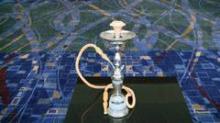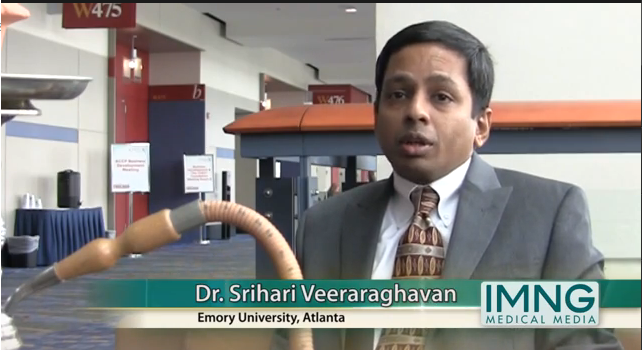User login
CHICAGO – Despite a national downturn in cigarette smoking, a growing number of young Americans are turning to hookah bars to smoke tobacco, a study has shown.
The trend is driven by the social nature of hookah bars and myths about the safety of smoking hookah, also called shisha, narghile, hubble-bubble, and goza, Dr. Srihari Veeraraghavan reported at the annual meeting of the American College of Chest Physicians.
For the first time, a large study showed hookah smoking had eclipsed cigarette smoking for both ever use (46.4% vs. 42.1%) and past-year use (28.4% vs. 19.6%) among 1,203 University of Florida students (BMC Public Health 2013;13:302).
<
More than a third of current cigarette smokers used hookah, but equally worrisome, 29% of current hookah smokers reported never having smoked a cigarette.
"We’ve made impressive strides in the last 40-50 years by reducing smoking in this country," he said in an interview. "And the concern is that students use hookah in their universities, and when they get out in their real life, they’re going to go back to cigarettes because it’s as addictive, if not more [so], than cigarettes."
Myths surrounding hookah/shisha smoking are that it is less addictive, less harmful, and contains less nicotine than conventional cigarettes, said Dr. Veeraraghavan of Emory University in Atlanta.
He highlighted a widely publicized 1997 New York Times article quoting one hookah smoker as saying cigarettes are for "nervous," "competitive" people, but that narghile smoking "teaches you patience and tolerance, and gives you an appreciation of good company."
Some smokers also believe the water in the pipe filters out toxins and that adding molasses or fruit to flavor the tobacco imparts a health benefit.
"Hookah smoking leads to cigarette smoking, and cigarette smokers planning to quit take up hookah thinking that it’s better," Dr. Veeraraghavan said.
Though data in humans are limited, a study found similar peak nicotine concentrations after smoking one cigarette vs. smoking a hookah for a maximum of 45 minutes, but that hookah smoking was associated with greater carbon monoxide levels and 1.7 times the exposure to nicotine (Am. J. Prev. Med. 2009;37:518-23).
A typical hookah session lasts about an hour and may involve 200 puffs. Thus, "in one hookah session, smokers may inhale the equivalent of 100 cigarettes," he said.
This is particularly concerning in light of the recent Canadian Youth Smoking Survey showing that hookah use increased 6% from 2006 through 2010 among kids, grades 9 through 12 (Prev. Chronic Dis. 2013 May 9;10E73). Once again, current cigarette smokers were more likely to use hookahs, but marijuana and alcohol use also predicted hookah use.
Dr. Veeraraghavan suggested that alternative forms of smoking such as hookahs, e-cigarettes, and marijuana should be included in all smoking surveys and that additional research is needed to elucidate the effects on pulmonary function and overall health. Better regulatory mechanisms are also needed, as laws are unclear about hookah smoking in restaurants and other public venues.
Finally, physicians should begin asking patients of all ages about their hookah use since younger adult smokers are less likely to visit the office, but parents will go home and talk to their kids – young or older – about the health risks posed by hookah smoking, he said.
For physicians unaware or uncertain about the emerging popularity of hookah smoking, Dr. Veeraraghavan concluded by showing a slide listing no fewer than 50 hookah bars all in the Chicago area, many not far from CHEST 2013.
Dr. Veeraraghavan reported having no relevant financial disclosures.
CHICAGO – Despite a national downturn in cigarette smoking, a growing number of young Americans are turning to hookah bars to smoke tobacco, a study has shown.
The trend is driven by the social nature of hookah bars and myths about the safety of smoking hookah, also called shisha, narghile, hubble-bubble, and goza, Dr. Srihari Veeraraghavan reported at the annual meeting of the American College of Chest Physicians.
For the first time, a large study showed hookah smoking had eclipsed cigarette smoking for both ever use (46.4% vs. 42.1%) and past-year use (28.4% vs. 19.6%) among 1,203 University of Florida students (BMC Public Health 2013;13:302).
<
More than a third of current cigarette smokers used hookah, but equally worrisome, 29% of current hookah smokers reported never having smoked a cigarette.
"We’ve made impressive strides in the last 40-50 years by reducing smoking in this country," he said in an interview. "And the concern is that students use hookah in their universities, and when they get out in their real life, they’re going to go back to cigarettes because it’s as addictive, if not more [so], than cigarettes."
Myths surrounding hookah/shisha smoking are that it is less addictive, less harmful, and contains less nicotine than conventional cigarettes, said Dr. Veeraraghavan of Emory University in Atlanta.
He highlighted a widely publicized 1997 New York Times article quoting one hookah smoker as saying cigarettes are for "nervous," "competitive" people, but that narghile smoking "teaches you patience and tolerance, and gives you an appreciation of good company."
Some smokers also believe the water in the pipe filters out toxins and that adding molasses or fruit to flavor the tobacco imparts a health benefit.
"Hookah smoking leads to cigarette smoking, and cigarette smokers planning to quit take up hookah thinking that it’s better," Dr. Veeraraghavan said.
Though data in humans are limited, a study found similar peak nicotine concentrations after smoking one cigarette vs. smoking a hookah for a maximum of 45 minutes, but that hookah smoking was associated with greater carbon monoxide levels and 1.7 times the exposure to nicotine (Am. J. Prev. Med. 2009;37:518-23).
A typical hookah session lasts about an hour and may involve 200 puffs. Thus, "in one hookah session, smokers may inhale the equivalent of 100 cigarettes," he said.
This is particularly concerning in light of the recent Canadian Youth Smoking Survey showing that hookah use increased 6% from 2006 through 2010 among kids, grades 9 through 12 (Prev. Chronic Dis. 2013 May 9;10E73). Once again, current cigarette smokers were more likely to use hookahs, but marijuana and alcohol use also predicted hookah use.
Dr. Veeraraghavan suggested that alternative forms of smoking such as hookahs, e-cigarettes, and marijuana should be included in all smoking surveys and that additional research is needed to elucidate the effects on pulmonary function and overall health. Better regulatory mechanisms are also needed, as laws are unclear about hookah smoking in restaurants and other public venues.
Finally, physicians should begin asking patients of all ages about their hookah use since younger adult smokers are less likely to visit the office, but parents will go home and talk to their kids – young or older – about the health risks posed by hookah smoking, he said.
For physicians unaware or uncertain about the emerging popularity of hookah smoking, Dr. Veeraraghavan concluded by showing a slide listing no fewer than 50 hookah bars all in the Chicago area, many not far from CHEST 2013.
Dr. Veeraraghavan reported having no relevant financial disclosures.
CHICAGO – Despite a national downturn in cigarette smoking, a growing number of young Americans are turning to hookah bars to smoke tobacco, a study has shown.
The trend is driven by the social nature of hookah bars and myths about the safety of smoking hookah, also called shisha, narghile, hubble-bubble, and goza, Dr. Srihari Veeraraghavan reported at the annual meeting of the American College of Chest Physicians.
For the first time, a large study showed hookah smoking had eclipsed cigarette smoking for both ever use (46.4% vs. 42.1%) and past-year use (28.4% vs. 19.6%) among 1,203 University of Florida students (BMC Public Health 2013;13:302).
<
More than a third of current cigarette smokers used hookah, but equally worrisome, 29% of current hookah smokers reported never having smoked a cigarette.
"We’ve made impressive strides in the last 40-50 years by reducing smoking in this country," he said in an interview. "And the concern is that students use hookah in their universities, and when they get out in their real life, they’re going to go back to cigarettes because it’s as addictive, if not more [so], than cigarettes."
Myths surrounding hookah/shisha smoking are that it is less addictive, less harmful, and contains less nicotine than conventional cigarettes, said Dr. Veeraraghavan of Emory University in Atlanta.
He highlighted a widely publicized 1997 New York Times article quoting one hookah smoker as saying cigarettes are for "nervous," "competitive" people, but that narghile smoking "teaches you patience and tolerance, and gives you an appreciation of good company."
Some smokers also believe the water in the pipe filters out toxins and that adding molasses or fruit to flavor the tobacco imparts a health benefit.
"Hookah smoking leads to cigarette smoking, and cigarette smokers planning to quit take up hookah thinking that it’s better," Dr. Veeraraghavan said.
Though data in humans are limited, a study found similar peak nicotine concentrations after smoking one cigarette vs. smoking a hookah for a maximum of 45 minutes, but that hookah smoking was associated with greater carbon monoxide levels and 1.7 times the exposure to nicotine (Am. J. Prev. Med. 2009;37:518-23).
A typical hookah session lasts about an hour and may involve 200 puffs. Thus, "in one hookah session, smokers may inhale the equivalent of 100 cigarettes," he said.
This is particularly concerning in light of the recent Canadian Youth Smoking Survey showing that hookah use increased 6% from 2006 through 2010 among kids, grades 9 through 12 (Prev. Chronic Dis. 2013 May 9;10E73). Once again, current cigarette smokers were more likely to use hookahs, but marijuana and alcohol use also predicted hookah use.
Dr. Veeraraghavan suggested that alternative forms of smoking such as hookahs, e-cigarettes, and marijuana should be included in all smoking surveys and that additional research is needed to elucidate the effects on pulmonary function and overall health. Better regulatory mechanisms are also needed, as laws are unclear about hookah smoking in restaurants and other public venues.
Finally, physicians should begin asking patients of all ages about their hookah use since younger adult smokers are less likely to visit the office, but parents will go home and talk to their kids – young or older – about the health risks posed by hookah smoking, he said.
For physicians unaware or uncertain about the emerging popularity of hookah smoking, Dr. Veeraraghavan concluded by showing a slide listing no fewer than 50 hookah bars all in the Chicago area, many not far from CHEST 2013.
Dr. Veeraraghavan reported having no relevant financial disclosures.
AT CHEST 2013

